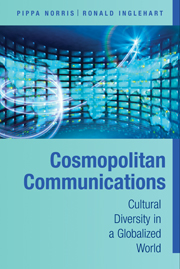Book contents
- Frontmatter
- Contents
- Tables and Figures
- Acknowledgments
- INTRODUCTION
- PART I FIREWALLS
- PART II CONSEQUENCES
- CONCLUSIONS
- 10 Cultural Convergence over Time?
- 11 The Implications for Cultural Policies
- Technical Appendix A: Concepts and Measures
- Technical Appendix B: List of Countries
- Technical Appendix C: Methods and Multilevel Regression Models
- Notes
- Select Bibliography
- Index
- Titles in the Series
10 - Cultural Convergence over Time?
Published online by Cambridge University Press: 05 June 2012
- Frontmatter
- Contents
- Tables and Figures
- Acknowledgments
- INTRODUCTION
- PART I FIREWALLS
- PART II CONSEQUENCES
- CONCLUSIONS
- 10 Cultural Convergence over Time?
- 11 The Implications for Cultural Policies
- Technical Appendix A: Concepts and Measures
- Technical Appendix B: List of Countries
- Technical Appendix C: Methods and Multilevel Regression Models
- Notes
- Select Bibliography
- Index
- Titles in the Series
Summary
We have argued throughout this book that the various versions of the cultural convergence thesis are deeply flawed, whether one has in mind the ‘media imperialism’ argument that was fashionable during the 1970s, the ‘Coca-colonization’ claim that was popular during the 1990s, or contemporary approaches advocating ‘cultural protectionism.’ The convergence thesis rests on the premise that repeated exposure to the ideas and images transmitted by CNN International, MTV, and Hollywood will gradually undermine indigenous values and norms. Consequently, many deeply conservative cultures fear that opening the floodgates to the American or Western media will erode faith in religion, respect for marriage and the family, and deference toward traditional sources of authority. But earlier chapters demonstrated how lack of access to globalized mass communications persists in many poor nations, limiting the diffusion of Western ideas and images. This book has documented the existence of multiple firewalls that prevent the mass media from penetrating parochial societies and thus influencing the culture in these places.
In this chapter let us loosen this premise, however, on the grounds that cosmopolitan communications continue to expand worldwide. Even if they have not yet reached all peoples and places, channels of mass communications and new information technologies have become widely accessible to the public in many middle-income emerging economies, such as South Africa, Mexico, and Argentina.
- Type
- Chapter
- Information
- Cosmopolitan CommunicationsCultural Diversity in a Globalized World, pp. 261 - 286Publisher: Cambridge University PressPrint publication year: 2009



